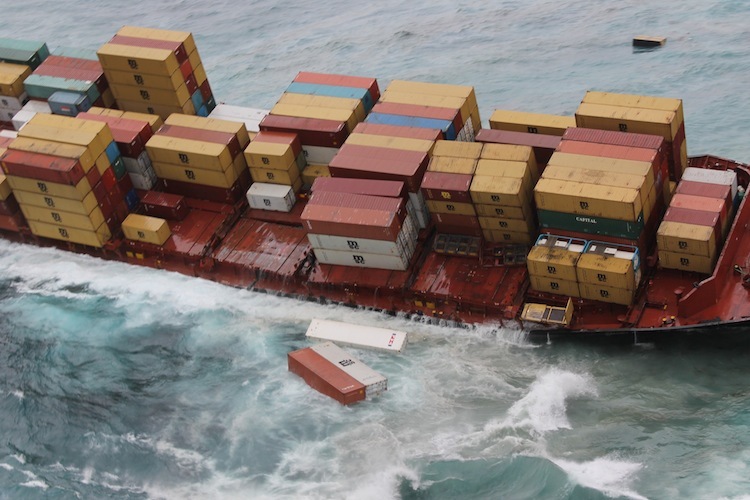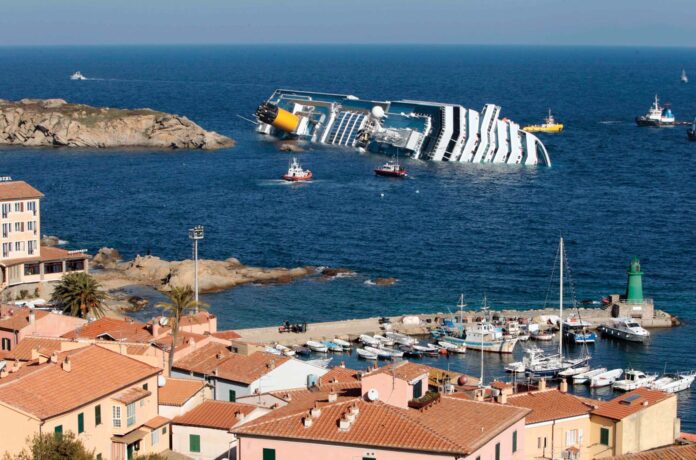Carnival Cruise Lines tragic accident in the Mediterranean sea highlights the growing concern many travelers have when vacationing overseas on destination resort vessels. Are cruises on the high seas, too foreign ports, as safe as we all assume?
After slamming into the rocky Italian coast of Giglio, a Tuscan island paradise, captain Francesco Schettino quickly abandoned ship and left hundreds of passengers still trapped in the sinking, crippled vessel. The captain was ordered by the Italian Port Authority director to “get back on board the ship to count the remaining, men, women and children,” but he refused. The captain was later taken into custody and charged with multiple counts of manslaughter and “abandoning the rescue.” More charges are pending as 11 people have been confirmed dead and 21 remain missing.
The captains actions are the equivalent of a hotel manager fleeing his burning building while women and children are still trapped inside. He is in violation of the most sacred of all sailor edicts, which calls for a captain to be the last person to leave a sinking ship after all passengers are accounted for and helped to safety. Captain Schettino was hired by Carnival Cruise Lines in 2002 as a security officer but he was abruptly promoted to captain in 2006. It’s curious how a “security officer” could become captain of such a large ship in this short period of time.

The impending criminal investigation against Captain Schettino and Carnival Cruise Lines will uncover many of these important details, but further preventative action is necessary to prevent any future harm to come to vacationers who chose to travel on a cruise ship – outside of the protection of U.S. regulation and law. This tragedy demonstrates the need for all Carnival ships that operate in U.S. waters or carry U.S. citizens, to go through a rigorous re-training program and re-inspection of each vessel to determine if appropriate fire-safety and life-saving equipment are available and if adequate safety procedures are in place, understood, and followed by the captain and crew members.
The ocean is dangerous. Accidents can happen at any moment while at sea.
Safety procedures are enacted to make sure the ships personnel help passengers who are not familiar with safety protocols or how to raise or lower the life boats. Carnival’s Costa Concordia passengers felt forced to jump into the frigid Mediterranean waters to save their lives as the ship began to capsize. Some of these scared passengers died after hitting the water. This accident occurred directly in front of a busy seaport, in shallow waters. It’s not hard to imagine the horrific outcome if this ship had struck a submerged container in open water – or any other large floating debris that is scattered throughout the worlds oceans. This ship could had flipped over and cast any survivors into the frigid ocean, to wait for rescue while the captain and crew rowed away on their lifeboats to safety. The potential for disaster is higher than most people understand.
Estimates predict between 500 and 2,500 containers are floating around the world at any time. They stay afloat and partially submerged for about 3 months from when they fall off a ship; they then sink to the bottom of the sea. Sailors around the world are fearful of them, but the general public does not know they are a threat; imperiling the cruisers who choose to vacation at sea.

The cruise ships are apparently much easier to sink than the public is aware of. The Costa Concordia rapidly took on water and began to sink as soon as it hit the seafloor and sprung a leak. Aren’t the ships required to be built with watertight chambers that seal during a water intrusion? It raises the question of how safe these vessels really are? Almost exactly 100 years after the Titanic tragedy, these ship are still prone to hull breaches and capsizing.
Carnival’s multi-billion dollar blunder should be a wake-up call to the real dangers of open-water cruising. The lack of regulation and oversight within the cruise industry puts all cruise travelers at risk. Vacationers who stay within the borders of America can expect a certain level of legal protection and regulatory safeguards that have been put in place by lawmakers, so residents and visitors can be assured that safety standards and operating procedures are being followed – for the health and safety of those who stay and play inside the boundaries of the United States of America. Vacationers forgo those protections once they travel outside of U.S. borders. Once a carnival cruise ship leaves port, it operates almost as its own sovereign country.
We rarely see the accidents, illnesses and all of the many other disturbing occurrences which happen at sea at the land-based U.S. hotels, resorts and casinos, but they all seem to be pervasive on cruise ships and in foreign ports. The ships are plagued with onboard thefts, disease and infection, sexual assaults, deaths, food poisoning, bed bugs, fires, and a litany of other problems that seem to befall cruise ships much more than U.S. located, land-based vacation resorts.
Just like an air marshal, all cruises should be required to have an independent, government staffed, public safety officer on board, and rotated among ships and cruise lines to make sure the vessels are operated within international law while in open waters, and respectful of other countries laws while operating in those waters. This would help minimize the amount of sewage that is illegally dumped into the ocean every year by the cruise line fleet.
Carnival stock dropped approximately 14 percent on the first day of trading since the accident, to eliminate $2.7 billion in shareholder market capitalization. An additional $1 billion will be needed to repair the ship and pay-down legal settlements that come from the sinking of the Costa Concordia. It is an expensive lesson to learn for Carnival who might want to track their fleet more carefully, so they know exactly where their ships are and when they are off course.
